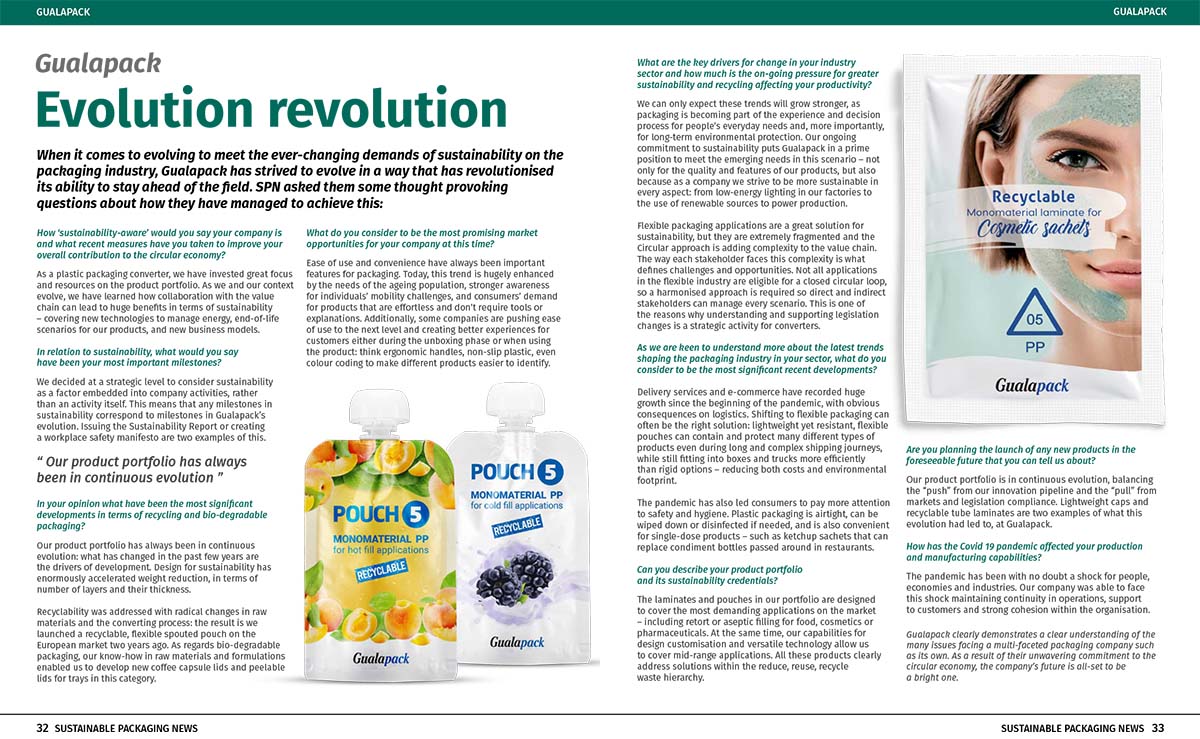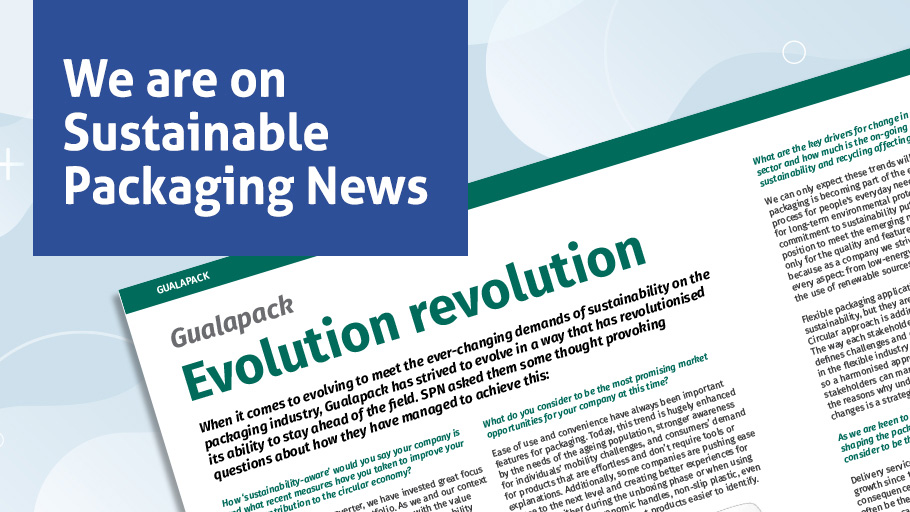When it comes to evolving to meet the ever-changing demands of sustainability on the packaging industry, Gualapack has strived to evolve in a way that has revolutionised its ability to stay ahead of the field.
Read the article on SPN news (download PDF).

Evolution revolution
When it comes to evolving to meet the ever-changing demands of sustainability on the packaging industry, Gualapack has strived to evolve in a way that has revolutionised its ability to stay ahead of the field. SPN asked them some thought provoking questions about how they have managed to achieve this:
How ‘sustainability-aware’ would you say your company is and what recent measures have you taken to improve your overall contribution to the circular economy?
As a plastic packaging converter, we have invested great focus and resources on the product portfolio. As we and our context evolve, we have learned how collaboration with the value chain can lead to huge benefits in terms of sustainability– covering new technologies to manage energy, end-of-life scenarios for our products, and new business models.
In relation to sustainability, what would you say have been your most important milestones?
We decided at a strategic level to consider sustainability as a factor embedded into company activities, rather than an activity itself. This means that any milestones in sustainability correspond to milestones in Gualapack’s evolution. Issuing the Sustainability Report or creating a workplace safety manifesto are two examples of this.
“Our product portfolio has always been in continuous evolution”
In your opinion what have been the most significant developments in terms of recycling and bio-degradable packaging?
Our product portfolio has always been in continuous evolution: what has changed in the past few years are the drivers of development. Design for sustainability has enormously accelerated weight reduction, in terms of number of layers and their thickness.
Recyclability was addressed with radical changes in raw materials and the converting process: the result is we launched a recyclable, flexible spouted pouch on the European market two years ago. As regards bio-degradable packaging, our know-how in raw materials and formulations enabled us to develop new coffee capsule lids and peelable lids for trays in this category.
What do you consider to be the most promising market opportunities for your company at this time?
Ease of use and convenience have always been important features for packaging. Today, this trend is hugely enhanced by the needs of the ageing population, stronger awareness for individuals’ mobility challenges, and consumers’ demand for products that are effortless and don’t require tools or explanations. Additionally, some companies are pushing ease of use to the next level and creating better experiences for customers either during the unboxing phase or when using the product: think ergonomic handles, non-slip plastic, even colour coding to make different products easier to identify.
What are the key drivers for change in your industry sector and how much is the on-going pressure for greater sustainability and recycling affecting your productivity?
We can only expect these trends will grow stronger, as packaging is becoming part of the experience and decision process for people’s everyday needs and, more importantly, for long-term environmental protection. Our ongoing commitment to sustainability puts Gualapack in a prime position to meet the emerging needs in this scenario – not only for the quality and features of our products, but also because as a company we strive to be more sustainable in every aspect: from low-energy lighting in our factories to the use of renewable sources to power production.
Flexible packaging applications are a great solution for sustainability, but they are extremely fragmented and the Circular approach is adding complexity to the value chain. The way each stakeholder faces this complexity is what defines challenges and opportunities. Not all applications in the flexible industry are eligible for a closed circular loop, so a harmonised approach is required so direct and indirect stakeholders can manage every scenario. This is one of the reasons why understanding and supporting legislation changes is a strategic activity for converters.
As we are keen to understand more about the latest trends shaping the packaging industry in your sector, what do you consider to be the most significant recent developments?
Delivery services and e-commerce have recorded huge growth since the beginning of the pandemic, with obvious consequences on logistics. Shifting to flexible packaging can often be the right solution: lightweight yet resistant, flexible pouches can contain and protect many different types of products even during long and complex shipping journeys, while still fitting into boxes and trucks more efficiently than rigid options – reducing both costs and environmental footprint.
The pandemic has also led consumers to pay more attention to safety and hygiene. Plastic packaging is airtight, can be wiped down or disinfected if needed, and is also convenient for single-dose products – such as ketchup sachets that can replace condiment bottles passed around in restaurants.
Can you describe your product portfolio and its sustainability credentials?
The laminates and pouches in our portfolio are designed to cover the most demanding applications on the market – including retort or aseptic filling for food, cosmetics or pharmaceuticals. At the same time, our capabilities for design customisation and versatile technology allow us to cover mid-range applications. All these products clearly address solutions within the reduce, reuse, recycle waste hierarchy.
Are you planning the launch of any new products in the foreseeable future that you can tell us about?
Our product portfolio is in continuous evolution, balancing the “push” from our innovation pipeline and the “pull” from markets and legislation compliance. Lightweight caps and recyclable tube laminates are two examples of what this evolution had led to, at Gualapack.
How has the Covid 19 pandemic affected your production and manufacturing capabilities?
The pandemic has been with no doubt a shock for people, economies and industries. Our company was able to face this shock maintaining continuity in operations, support to customers and strong cohesion within the organisation.
Gualapack clearly demonstrates a clear understanding of the many issues facing a multi-faceted packaging company such as its own. As a result of their unwavering commitment to the circular economy, the company’s future is all-set to be a bright one.





